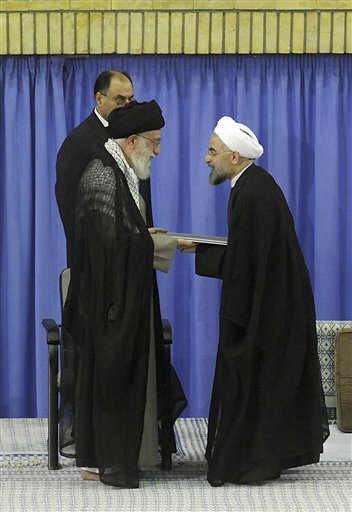
By BRADLEY KLAPPER
In this picture released by the official website of the Iranian supreme leader’s office, Supreme Leader Ayatollah Ali Khamenei, left, gives his official seal of approval to President-elect Hasan Rouhani, in an official endorsement ceremony, in Tehran, Iran, Saturday, Aug. 3, 2013. Iran’s supreme leader has formally endorsed Hasan Rouhani as president opening the way for the moderate cleric to take over from outgoing President Mahmoud Ahmadinejad. (AP Photo/Office of the Iranian Supreme Leader)
WASHINGTON (AP) — As Iran’s new president takes over, new U.S. penalties against the country appear a done deal.
In a letter to President Barack Obama, 76 senators are demanding tougher punishment on Iran’s economy until the Islamic republic scales back its nuclear program. It also urges Obama to consider military options while keeping the door open to diplomacy.
The Senate letter, a copy of which was obtained Saturday by The Associated Press, comes just days after the House overwhelmingly passed new restrictions on Iran’s oil sector and its mining and construction industries. Senators are expected to take up the same package in September.
“Until we see a significant slowdown of Iran’s nuclear activities, we believe our nation must toughen sanctions and reinforce the credibility of our option to use military force at the same time as we fully explore a diplomatic solution to our dispute with Iran,” says the letter, which will be delivered Monday.
The Obama administration is concerned Congress’ effort could undercut Iran’s relatively moderate President-elect Hasan Rouhani, who was formally endorsed by Iran’s ayatollah on Saturday and takes the oath of office Sunday. Rouhani has pledged to follow a “path of moderation” and promised greater openness over Iran’s nuclear program.
Obama wants to give Rouhani a chance to prove his seriousness.
The U.S. believes Iran has been working for years to develop nuclear weapons. Iran insists its program is for peaceful energy and research purposes.
Rouhani’s victory signaled Iran’s clear dissatisfaction, the senators said. But they noted that all final decisions on nuclear matters rest with Supreme Leader Ayatollah Ali Khamenei and said Iran must not be allowed to use any new nuclear negotiations with world powers to stall for time.
“Iran today continues its large-scale installation of advanced centrifuges,” their letter said. “This will soon put it in the position to be able to rapidly produce weapons-grade uranium, bringing Tehran to the brink of a nuclear weapons capability.”
“We need to understand quickly whether Tehran is at last ready to negotiate seriously,” it added. “Iran needs to understand that the time for diplomacy is nearing its end.”
Obama prefers diplomacy. He has given Iran until sometime next spring to prove to the world that its program is peaceful.
If Iran fails to do so, the stage may be set for military intervention from the U.S. or Israel, which sees Iranian nuclear weapons capacity as an existential threat and has warned of taking action according to its own timeline.



